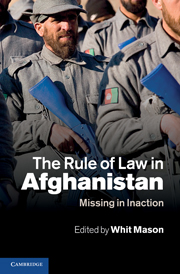Book contents
- Frontmatter
- Contents
- Contributors
- Preface and acknowledgements
- 1 Introduction
- PART I The scope and nature of the problem
- PART II The context
- PART III The political economy of opium
- PART IV Afghan approaches to security and the rule of law
- PART V International interventions
- 12 Exogenous state-building
- 13 Grasping the nettle
- 14 Lost in translation
- PART VI Kandahar
- PART VII Conclusion
- Index
- References
12 - Exogenous state-building
The contradictions of the international project in Afghanistan
Published online by Cambridge University Press: 01 June 2011
- Frontmatter
- Contents
- Contributors
- Preface and acknowledgements
- 1 Introduction
- PART I The scope and nature of the problem
- PART II The context
- PART III The political economy of opium
- PART IV Afghan approaches to security and the rule of law
- PART V International interventions
- 12 Exogenous state-building
- 13 Grasping the nettle
- 14 Lost in translation
- PART VI Kandahar
- PART VII Conclusion
- Index
- References
Summary
In the contemporary writing on state-building in post-conflict situations, remarkably little attention is paid to what it takes to build a state. There is much advice on policy priorities and sequencing – security, rule of law, humanitarian assistance, fast pay-out of a peace dividend, demobilisation, elections, and so on – but much less attention to the basic ingredients that are required for the enterprise.
Historical experience and the political science literature suggest four necessary components: coercion, capital, legitimacy and leadership. In Europe, as Charles Tilly (1990) tells us, the modern state developed as local rulers marshalled revenues to pay for armies to fight other rulers; protection and increasingly other services were provided to their subjects to ensure continued flows of resources, and the state became a going concern.
Time is commonly also added in recognition of the fact that most contemporary states are the product of a long historical process of state-formation. Yet even these cases typically have some periods of more active state-building, when leaders mobilise arms, capital and legitimacy in ways that decisively strengthen the state. Given the internationalised nature of current state-building, arguably the most central, but also the least addressed, question is therefore to what extent the four components of state-building can be effectively provided by international actors, as opposed to being mobilised through an endogenous process.
- Type
- Chapter
- Information
- The Rule of Law in AfghanistanMissing in Inaction, pp. 225 - 248Publisher: Cambridge University PressPrint publication year: 2011
References
- 7
- Cited by



